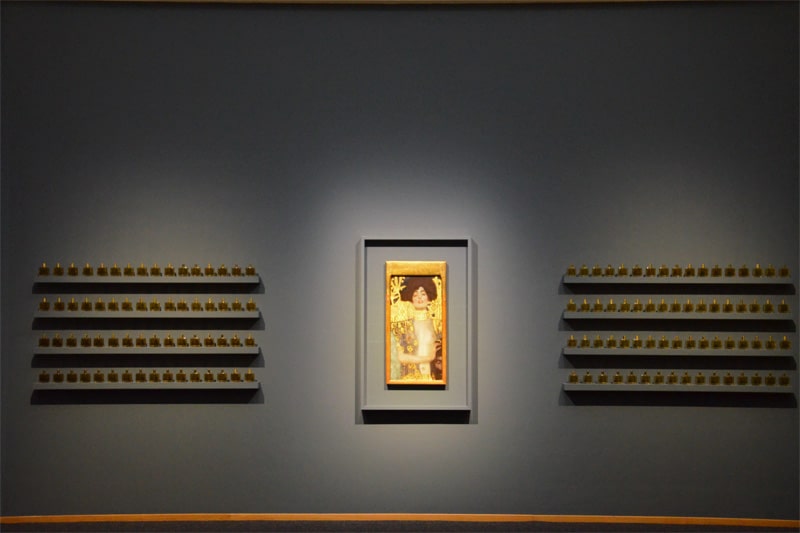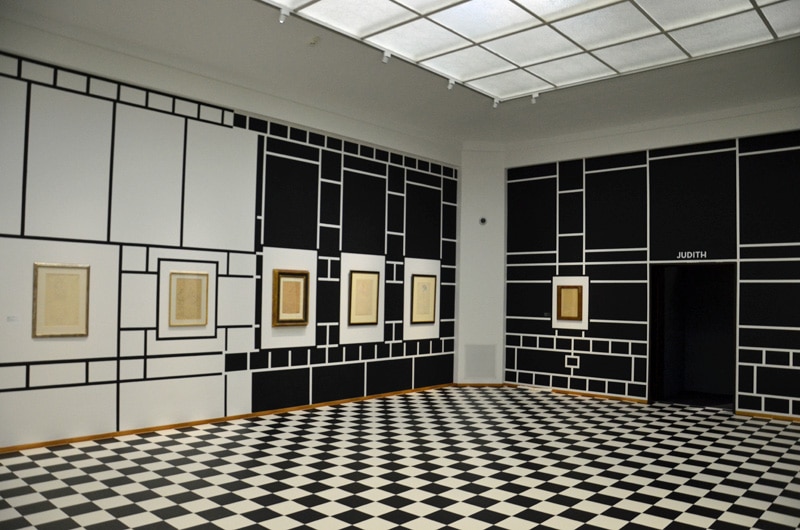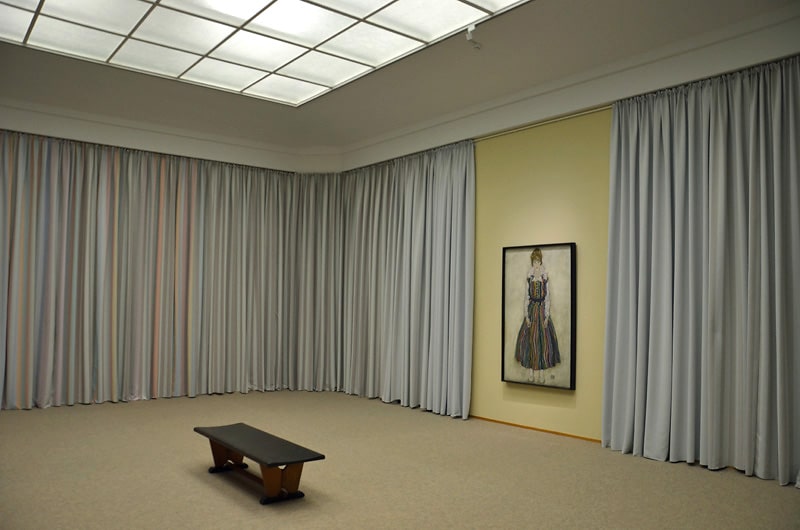Er zijn buitenkansen die je te baat moet nemen. Het Portret van Edith van Egon Schiele van zijn vrouw Edith krijgt in het Gemeentemuseum Den Haag eenmalig gezelschap van Gustav Klimts Judith I uit Wenen. Twee fascinerende werken, die beide hoogst zelden worden uitgeleend. En hoewel de kunstenaars elkaar kenden en waardeerden, is er bijna geen groter verschil denkbaar dan tussen de twee afgebeelde vrouwen. Daarom vijf redenen om deze tentoonstelling te bezoeken. Welkom in het Wenen van 1900!

1. Judith reist niet veel
Het portret van Schieles vrouw Edith is een van de topstukken van het Gemeentemuseum. Directeur Benno Tempel ziet het op gelijke hoogte met ‘magische meisjes’ als de Mona Lisa of het Meisje met de parel, maar zo bekend bij het grote publiek is zij nooit geworden. [hints]Zo nu en dan probeert het Gemeentemuseum hier iets aan te veranderen, enkele jaren geleden nog met het project Edith als muze van kunstenares Puck Verkade.[/hints]Edith is het enige schilderij van Schiele in een Nederlandse collectie. Bovendien is het stuk te kwetsbaar om vaak op reis te gaan.
Toch is het nu uitgeleend. Dat komt mede doordat veel van Schieles werk de afgelopen jaren is teruggegeven aan Joodse erfgenamen. [hints]De film Woman in gold (2015) vertelt het verhaal van de juridische strijd die Maria Altmann voerde om vijf schilderijen uit de familiecollectie terug te krijgen, onder andere van het Weense museum Belvédère.[/hints]Daardoor is de Schiele-spoeling in Wenen dun geworden. Museum Belvédère aldaar wilde Portret van Edith erg graag lenen en was bereid daar iets moois tegenover te stellen. Edith hing er van de winter naast hun topstuk Judith I van Klimt. Nu zijn ze samen hier. Ook Judith reist niet veel; het vereist zelfs toestemming van het Bundesdenkmalamt (de Oostenrijkse monumentenzorg). En inderdaad, de ontmoeting met beide dames is zonder meer magisch.
2. Wiener Secession
Egon Schiele kende Gustav Klimt goed en beschouwde hem als een van zijn leermeesters. Klimt had met andere kunstenaars de Wiener Secession opgericht, een groep die zich verzette tegen de oude kunst en de staatscensuur. Klimt dook, beïnvloed door Jan Toorop, vooral de Jugendstil in, terwijl de jongere Schiele meer expressionistisch werkte. Die expressionistische lijn zette Oskar Kokoschka voort. Van Klimt, Schiele én Kokoschka zijn tekeningen en ontwerpen te zien op de tentoonstelling. Die valt bovendien grotendeels samen met de grote Toorop-expositie in het Gemeentemuseum. Zo is een heel tijdperk in één keer te bekijken.

3. Freud
Ondanks de overeenkomsten tussen de kunstenaars zijn beide vrouwen werelden van verschil. Edith is afgebeeld als de kuise ideale huisvrouw. Dat was zij niet werkelijk – het huwelijk was verre van perfect – maar zo wilde Egon haar graag zien. Judith is in de Bijbel een deugdzame weduwe, die haar verleidingskunsten alleen inzet om de vijandelijke generaal Holofernes dronken te voeren en te onthoofden. Klimt maakt van haar een zwoele, op genot beluste vrouw. Het hoofd van Holofernes is half in beeld, maar speelt een bijrol.
Het is tekenend voor het dubbelzinnige seksuele klimaat in het Wenen van rond 1900. Mannen bezochten massaal prostituees, van vrouwen werd zedig gedrag gevraagd. De vrouw werd gezien als maagd of als hoer, als femme fatale of als femme fragile; een middenweg was er niet. Psycholoog Sigmund Freud was een van degenen die het meest denigrerend over vrouwen dachten en schreven. Hij zag de vrouw als een redeloos wezen, gedreven door haar seksualiteit. Toch was de vrouwenemancipatie niet tegen te houden; in december 1918 werd het vrouwenkiesrecht ingevoerd. Klimt en Schiele maakten dat niet meer mee. Eerder dat jaar stierven zij beiden aan de Spaanse griep.

4. Gesamtkunstwerk in een Gesamtkunstwerk
In de tentoonstelling hebben Edith en Judith elk een eigen zaal, die recht doet aan de sfeer van de schilderijen. Edith licht, met gordijnen die de stof van de jurk in herinnering brengen, Judith duister en zwoel, met goudglanzende parfumflesjes. Modehuis Maison the Faux tekende voor het revolutionaire ontwerp, dat past in de teneur van de tentoongestelde periode om ‘Gesamtkunstwerke’ neer te zetten. Bovendien klopt de vormgeving perfect met het Berlage-museumgebouw. Dit gebouw is zelf een Gesamtkunstwerk en heeft niet voor niets een catalogusnummer in de museumcollectie. En nu we het erover hebben: met haar bewerkte lijst, waarop de voorstelling doorloopt, is Judith I eigenlijk ook een Gesamtkunstwerk. In de aangrenzende zalen, gedecoreerd met zwartwitte geometrische patronen, zien we onder andere sieraden van de Wiener Werkstätte, affiches, boekontwerpen en tekeningen.

5. Boek
De tentoonstellingspublicatie is als de expositie zelf: klein maar fijn. Conservator Frouke van Dijke gaat in twee essays dieper op de materie in. Kunsthistorisch op Klimt en Schiele, maatschappelijk-historisch op Judith, Edith en de beeldvorming van de vrouw. Uitstekend foto- en reproductiemateriaal maakt dit boek nog meer een genot om te lezen.
Klimt-Schiele. Gemeentemuseum Den Haag, tot en met 19 juni 2016.
